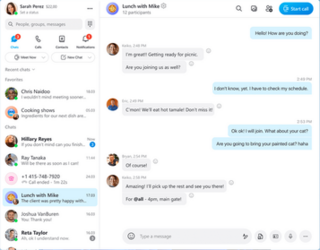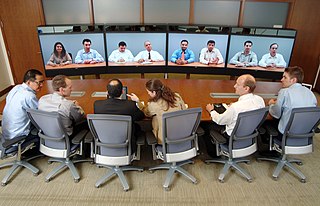The Session Initiation Protocol (SIP) is a signaling protocol used for initiating, maintaining, and terminating communication sessions that include voice, video and messaging applications. SIP is used in Internet telephony, in private IP telephone systems, as well as mobile phone calling over LTE (VoLTE).
Voice over Internet Protocol (VoIP), also called IP telephony, is a method and group of technologies for voice calls, the delivery of voice communication sessions over Internet Protocol (IP) networks, such as the Internet.

Tandberg was an electronics manufacturer located in Oslo, Norway and New York City, United States. The company began in the radio field, but became more widely known for their reel-to-reel tape recorders as well as cassette decks and televisions. The original company went bankrupt in 1978, after a sharp financial downturn. The following year, the company re-formed whilst their data division was split off as Tandberg Data, including the tape recording division, which reduced its scope to data recording.

Skype is a proprietary telecommunications application operated by Skype Technologies, a division of Microsoft, best known for VoIP-based videotelephony, videoconferencing and voice calls. It also has instant messaging, file transfer, debit-based calls to landline and mobile telephones, and other features. Skype is available on various desktop, mobile, and video game console platforms.

Google Talk was an instant messaging service that provided both text and voice communication. The instant messaging service was variously referred to colloquially as Gchat, Gtalk, or Gmessage among its users.

Microsoft NetMeeting is a discontinued VoIP and multi-point videoconferencing program offered by Microsoft. NetMeeting allows multiple clients to host and join a call that includes video and audio, text chat, application and desktop sharing, and file sharing. It was originally bundled with Internet Explorer 3 and then with Windows versions from Windows 95 to Windows Server 2003.

Skype for Business Server is real-time communications server software that provides the infrastructure for enterprise instant messaging, presence, VoIP, ad hoc and structured conferences and PSTN connectivity through a third-party gateway or SIP trunk. These features are available within an organization, between organizations and with external users on the public internet or standard phones.

Jajah was a VoIP provider, founded by Austrians Roman Scharf and Daniel Mattes in 2005. The Jajah headquarters was located in Mountain View, CA, USA, and Luxembourg. Jajah maintained a development centre in Israel. On 23 December 2009, it was announced that Jajah had been bought by Telefónica through its subsidiary Telefónica Europe. In December 2013, Telefónica announced that Jajah would shut down at the end of January 2014.

Videotelephony is the two-way or multipoint reception and transmission of audio and video signals by people in different locations for real-time communication. A videophone is a telephone with a video camera and video display, capable of simultaneous video and audio communication. Videoconferencing implies the use of this technology for a group or organizational meeting rather than for individuals, in a videoconference. Telepresence may refer either to a high-quality videotelephony system or to meetup technology, which can go beyond video into robotics. Videoconferencing has also been called visual collaboration and is a type of groupware.

Radvision was a provider of video conferencing solution and enabling products for IP communication developers based in Tel Aviv, Israel. Radvision was acquired by Avaya in June 2012. Spirent Communications acquired Radvision's Technology Business Unit from Avaya in July 2014, to become Spirent Developer Tools Business Unit.
This is a comparison of voice over IP (VoIP) software used to conduct telephone-like voice conversations across Internet Protocol (IP) based networks. For residential markets, voice over IP phone service is often cheaper than traditional public switched telephone network (PSTN) service and can remove geographic restrictions to telephone numbers, e.g., have a PSTN phone number in a New York area code ring in Tokyo.
The Bus Uncle is a Hong Kong Cantonese viral video depicting a verbal altercation between two men aboard a KMB bus in Hong Kong on 27 April 2006. The older and more belligerent of the two men was quickly nicknamed the "Bus Uncle", from the common Hong Kong practice of referring to older men as "Uncle" (阿叔). The altercation was recorded by a nearby passenger and uploaded to the Hong Kong Golden Forum, YouTube, and Google Video. The video became YouTube's most viewed video in May 2006, attracting viewers with the Bus Uncle's rhetorical outbursts and copious use of profanity, receiving 1.7 million hits in the first 3 weeks of that month.
Mobile VoIP or simply mVoIP is an extension of mobility to a voice over IP network. Two types of communication are generally supported: cordless telephones using DECT or PCS protocols for short range or campus communications where all base stations are linked into the same LAN, and wider area communications using 3G or 4G protocols.

H.323 is a recommendation from the ITU Telecommunication Standardization Sector (ITU-T) that defines the protocols to provide audio-visual communication sessions on any packet network. The H.323 standard addresses call signaling and control, multimedia transport and control, and bandwidth control for point-to-point and multi-point conferences.
Truphone is a GSMA-accredited global mobile network that operates its service internationally. The company is headquartered in London and has offices in ten other countries, being spread across four continents.

Jitsi is a collection of free and open-source multiplatform voice (VoIP), video conferencing and instant messaging applications for the Web platform, Windows, Linux, macOS, iOS and Android. The Jitsi project began with the Jitsi Desktop. With the growth of WebRTC, the project team focus shifted to the Jitsi Videobridge for allowing web-based multi-party video calling. Later the team added Jitsi Meet, a full video conferencing application that includes web, Android, and iOS clients. Jitsi also operates meet.jit.si, a version of Jitsi Meet hosted by Jitsi for free community use. Other projects include: Jigasi, lib-jitsi-meet, Jidesha, and Jitsi.
InSoft Inc. was an American developer of network-based communications software and multimedia software founded in 1992 in Mechanicsburg, Pennsylvania. The company’s applications included Communique, which is used for desktop collaboration and videoconferencing.
iMeet was a cloud-based video conferencing platform built in HTML 5 and Adobe Flash. iMeet allows up to 125 participants to communicate using traditional landline audio or VoIP audio and to video conference through webcams. iMeet was launched in general release in January 2011. End of product lifecycle 1 April 2019.
Comparison of user features of messaging platforms refers to a comparison of all the various user features of various electronic instant messaging platforms. This includes a wide variety of resources; it includes standalone apps, platforms within websites, computer software, and various internal functions available on specific devices, such as iMessage for iPhones.











